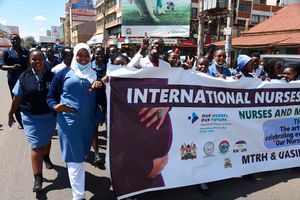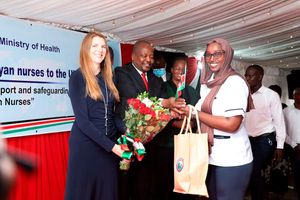Kenya sends second batch of 76 nurses to UK as 79 fail English test

Health CS Susan Nakhumicha poses for a photograph with nurses at Afya House in Nairobi on August 21, 2023, during the flagging-off ceremony of nurses going to work in the UK
Health Cabinet Secretary Susan Nakhumicha on Monday (August 21) flagged off the second batch of 76 nurses from Kenya to work in the United Kingdom.
The CS revealed that the second batch of nurses, selected from 701 applicants, will leave the country on the 24th of this month.
This follows the Bilateral Labour Agreement (BLA) signed between Kenya and the UK in July last year by President Uhuru Kenyatta and former UK Prime Minister Boris Johnson.
The CS further revealed that only 424 nurses met the requirements and their applications were submitted to various recruiters for consideration, while 277 did not.
According to the progress report on the recruitment of Kenyan nurses under the Kenya-UK bilateral health workforce, released by the Nursing Council of Kenya (NCK) and the Ministry of Health, 198 applicants did not sit the International English Language Testing System (IELTS) or Occupational English Test (OET), 79 failed the IELTS tests, 200 did not sit the Computer Based Testing (CBT) 200 while 77 failed the CBT.
The report released by NCK further reveals that 52 candidates of those who recently applied passed interviews and are awaiting Certificate of Sponsorship (COS) processing and pre-employment checks (46 being processed by Royal Berkshire Hospital (RBH) and 6 with Oxford University), 36 nurses did not pass interviews because they have inadequate experience.
They had either worked in hospitals with low bed capacity (less than 200 patients – bed) or did not satisfy the recruiting panel. Seventy-seven nurses met all the requirements and their CVs and application documents have been shared with recruiting agencies in the UK while 75 nurses met requirements though their applications have not been submitted to the recruiting agencies. Ten nurses dropped out of the process for personal reasons.
According to Dr Edna Tallam-Kimaiyo, the Registrar/CEO of the Nursing Council of Kenya, in order to increase the success rate of nurses recruited under this bilateral agreement, they have made a number of recommendations which include:
- Placement of nurses on a six (6) to twelve (12-month internship programme in GOK hospitals with a bed capacity of at least 200 patients (most trusts give preference to nurses with such experience).
- Publishing the guidelines for the bilateral agreement to provide for a procurement agent(s) to take over the current role being played by NCK on an interim basis.
- Having a continuous engagement of nurses in providing information on successful and unsuccessful candidates to strengthen the pipeline.
- Submitting quarterly progress reports to MOH on the progress of BLA implementation.
- Conducting a sensitisation webinar on bilateral agreement jobs and their working conditions.
- Nurses to be supported by the Kenya Medical Training Institute (KMTC) on English proficiency and Computer Based Testing (CBT).
- Advertising for continuous recruitment and sustainable supply.
“At the heart of every thriving healthcare system lies the dedication and expertise of our nurses, they are often the unsung heroes of our healthcare sector, yet the pillars of our healthcare infrastructure. The contributions of our nurses to the well-being of our society are truly invaluable,” CS Nakhumicha said.
She added that the government-to-government bilateral labour agreement between Kenya and the United Kingdom exemplifies the strength and benefits of international collaboration and partnerships.
“It offers an opportunity for exchange of skills and knowledge in the field of healthcare while fostering a stronger bond between our nations, promoting cultural exchange and understanding, while at the same time addressing the challenges in our respective healthcare systems.”
The Health CS added: “I reckon that questions abound on the impact of this agreement regarding the drain on our domestic healthcare resources. Let me allay these fears today by stating that this agreement bears testament to a common spirit of mutual respect and shared responsibility,” she said.
She added: “The capacity to send skilled nurses abroad reflects the strength of our own healthcare workforce. Thus, we have worked tirelessly to invest in training, education, and career development for our nurses at home, ensuring a sustainable pipeline of skilled healthcare professionals for the future.”
The report also highlights that 161 Kenyan nurses are currently in the UN since the inception of the bilateral agreement.
The CS asked all to remember that healthcare is a global issue which constantly requires new and shared knowledge.
“Today, the world faces numerous challenges, and the COVID-19 pandemic reminded us of the importance of international cooperation in addressing public health crises. The success of the BLA not only aids our respective healthcare systems but also reinforces the principle that by working together, we can overcome the most daunting of challenges,” she said.
“It also puts us in a pole position to also seek specialist skills from other nations where we may have none.
Embracing diversity allows us to better understand and address the unique healthcare needs of our population,” the CS added.
Last year, the first batch of 19 nurses qualified to work in the UK after a rigorous process was undertaken to get the final list from 3, 329 nurses who had applied.
Of the 19, 13 were attached to the Oxford University Hospital.
[email protected]





